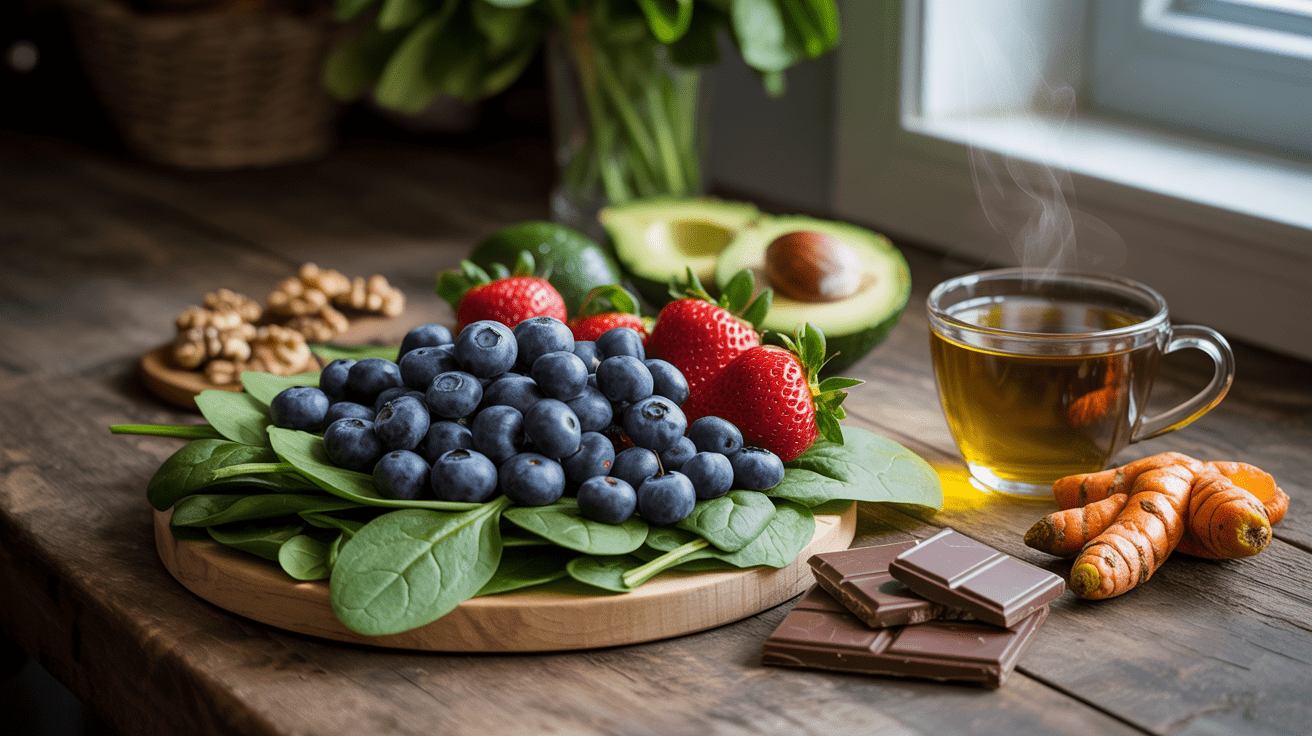Anti-Inflammatory Foods: 10 Easy Ways to Add Them Daily
What Are Anti-Inflammatory Foods?
Definition and Purpose
Anti-inflammatory foods are the foods that help your body feel better by fighting inflammation. Inflammation is when your body gets red, swollen, or painful — kind of like when you scrape your knee. But sometimes, inflammation happens inside your body, and you don’t even know it. These foods calm it down!
Common Causes of Inflammation in the Body
Inflammation can happen because of stress, not sleeping well, or eating too much junk food. Foods that are fried, full of sugar, or overly processed can cause your body to react with inflammation. That’s why what you eat really matters!
How Diet Affects Chronic Inflammation
If you eat unhealthy foods all the time, your body stays inflamed — and that can lead to problems like heart disease or tiredness. But when you eat anti-inflammatory foods, you’re helping your body stay cool, calm, and strong.
Why You Should Eat Anti-Inflammatory Foods Every Day
Health Benefits (Reduced Pain, Better Digestion, Brain Health)
Anti-inflammatory foods can make your body feel better every day. They help with:
Less pain in your joints
Easier digestion (so your tummy feels good)
Sharper thinking and memory
Long-Term Disease Prevention (Heart, Autoimmune, etc.)
Eating these foods can also protect you in the long run. They may lower your chances of getting diseases like:
Heart problems
Diabetes
Autoimmune issues (like arthritis)
Impact on Energy, Skin, and Mood
Do you want more energy? Clearer skin? Better moods? Anti-inflammatory foods help with all of that. When your body is not fighting inflammation all the time, it can focus on keeping you feeling great!
10 Easy Ways to Add Anti-Inflammatory Foods to Your Diet
1. Start Your Morning with Berries
Berries like blueberries, strawberries, and raspberries are full of antioxidants. Just add them to yogurt, cereal, or oatmeal for a sweet and healthy start.
2. Swap Refined Grains for Whole Grains
Instead of white bread or pasta, try brown rice, oats, or quinoa. Whole grains have fiber, which helps your belly and lowers inflammation.
3. Add Leafy Greens to Your Lunch
Spinach, kale, or arugula are packed with vitamins. Add them to sandwiches, wraps, or salads. They help your body fight inflammation from the inside.
4. Cook with Extra Virgin Olive Oil
Ditch the butter and use olive oil instead. It’s full of healthy fats that protect your heart and joints.
5. Include Fatty Fish Twice a Week
Fish like salmon, sardines, and mackerel are full of omega-3s — special fats that reduce inflammation. Grill or bake them for dinner twice a week.
6. Sprinkle Turmeric into Soups or Smoothies
Turmeric is a yellow spice that works like a natural anti-inflammatory pill. Add a pinch to soup, tea, or even a smoothie. A little goes a long way!
7. Replace Sugary Snacks with Nuts and Seeds
Almonds, walnuts, chia seeds, and flaxseeds are great for fighting inflammation. Keep a small bag in your kitchen or purse for a healthy snack.
8. Sip Green Tea Instead of Sugary Drinks
Green tea has natural plant compounds that help calm your body. Try it warm or iced — just skip the sugar.
9. Try Fermented Foods Like Kimchi or Yogurt
These foods are good for your gut. A healthy gut helps lower inflammation. Add a spoon of yogurt to breakfast or a little kimchi to your lunch.
10. Use Dark Chocolate as a Healthy Treat
Yes, you can eat chocolate! Just make sure it’s dark chocolate (70% cocoa or more). It has antioxidants that help your body relax.
Tips to Stay Consistent with Anti-Inflammatory Eating
Plan Weekly Meals Around Anti-Inflammatory Staples
Make a list of anti-inflammatory foods you like and plan meals with them. Example:
Breakfast: Oatmeal with berries
Lunch: Quinoa salad with leafy greens
Dinner: Salmon with sweet potatoes
Shop with a Focus on Whole, Unprocessed Foods
At the store, try to buy foods with simple ingredients. Skip the stuff with long labels you can’t pronounce. Shop the outer aisles — that’s where the fresh food is.
Batch Cook or Prep Anti-Inflammatory Snacks
Chop veggies, portion out nuts, or make smoothie packs ahead of time. It’s easier to make healthy choices when the good stuff is already ready!
Final Thoughts
Eating anti-inflammatory foods isn’t hard — and it’s one of the best things you can do for your body and mind. From berries to leafy greens to green tea, these foods help you feel great, fight disease, and keep your energy up.
You don’t need to change everything at once. Just start small. Pick one or two tips from this post and try them this week.
